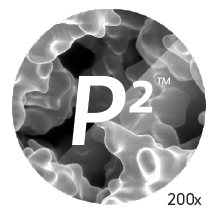
-
P2 Porous Coating
Aids in the apposition of bone for superior in-growth results.1
-
Cruciform Pegs
Peripherally placed to provide initial component fixation and stability.2
-
Asymmetric Baseplate Design
Designed to maximize cortical coverage and prevent overhang.3
-
Tri-flange Bladed Keel
Bone sparing geometry optimized for cementless knee replacement. Designed to provide rotational stability and enhance initial fixation.3

Dual Pore Technology*
The industry’s only porous coating with two distinct pore sizes to optimize both immediate and long-term fixation.1
Superior Ratio Of Contact Area and Coefficient Of Friction
P2’s large pores provide excellent initial fixation with an aggressive scratch fit. The small pores combined with increased contact area create an osteo-conductive environment which facilitates long-term biologic in-growth fixation.1
Scientifically Proven
P2 is backed by the world’s largest metaphyseal animal study to ascertain Apposition Bone Index (ABI), Mineral Apposition Rate (MAR), % Bone In-growth, and Axial Pull-out Force.1
*Large Pores - Pore size between each non-spherical bead = 200-525 μm Small Pores - Pore size within each non-spherical bead = 25-65 μm
-
P2™ Testing Summary 0020327-001 Rev A 10/14
-
3D Knee™ Technical Monograph 0011102-004
-
Bhimji, Safia, and R. Michael Meneghini. “Micromotion of cementless tibial baseplates: keels with adjuvant pegs offer more stability than pegs alone.” The Journal of Arthroplasty 29.7 (2014): 1503-1506.
-
Meneghini, R. Michael, et al. “A dual-pivot pattern simulating native knee kinematics optimizes functional outcomes after total knee arthroplasty.” The Journal of Arthroplasty 32.10 (2017): 3009-3015.
-
Mahoney, Ormonde M., et al. “The effect of total knee arthroplasty design on extensor mechanism function.” The Journal of Arthroplasty 17.4 (2002): 416-421.


